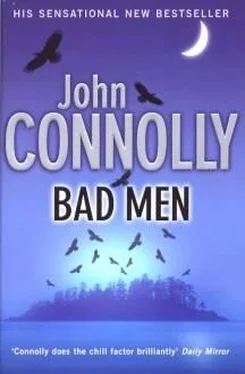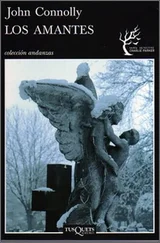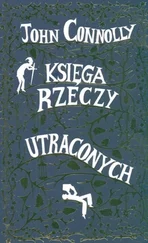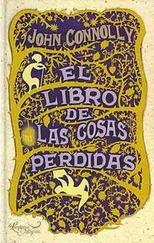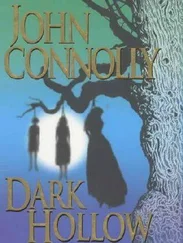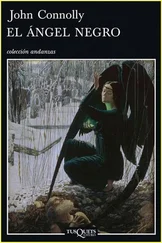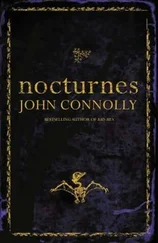It was a moth, a gray moth. Somehow, Carl had managed to disturb a whole bunch of them in the trees. That was the only excuse he could find, even as he backed toward his truck and recalled the shape that they had somehow formed: the shape of a woman.
That was all beside the point. Joe Dupree, the freak cop, had killed Carl’s brother, and now there would be payback for what he had done. For the chance of revenge, Carl was prepared to risk a trip into the woods. After all, he would not be going in alone.
Carl looked at his watch, hissed in irritation, and returned to the engine of his truck.
The first boat, piloted by Scarfe, came in sight of Cray Cove shortly before nine. They could barely see the island through the wall of snow, but Scarfe knew what he was doing. Without him, they would have run aground on rocks and drowned before they even came within sight of land.
Despite the weather, Scarfe had enjoyed being in command of a boat again. Being on the sea was one of the things he had missed most while locked up. Scarfe’s father knew about boats, and had passed on that knowledge to his son. As soon as the diesel engine began to turn over, and the vibrations commenced beneath his feet, Scarfe was at home. Under other circumstances, he would have cranked the boat faster as soon as they were out on the bay. Instead, he throttled down and kept a steady pace across the water in the face of the wind, until at last they came to the jetty. Powell tied the boat up, and, with a hint of regret, Scarfe cut the engine. He looked out on the silhouette of the island, barely visible through the falling flakes, and thought again that it was strange to see an outer island so thickly forested. Most of them boasted little more than sawgrass and burdock, but Sanctuary was different. Sanctuary had always been different.
The snow, thought Moloch, was a mixed blessing: the weather would keep other people indoors, and permit them to move about with greater ease, but there was now the risk of some of them getting separated and lost. And if anyone did spot them, they would have a hard time explaining why they were wandering around in a near blizzard.
Yet as soon as he set foot on the island, Moloch’s fears seemed to dissipate. Images flashed through his mind, pictures from his dreams and other, less familiar thoughts. He saw trails hidden from the eyes of others. He recalled the names of trees and plants. A great wave of understanding broke upon him.
I know this place.
I know it.
Moloch gestured to Dexter, Powell, Shepherd, and Scarfe, inviting them to follow him. Tell said nothing. Willard just watched them quietly.
“You stay here for now,” Moloch told Tell and Willard. “Watch the boat. When we get back, we’ll need to leave fast.”
Then they moved away, slowly fading into the gathering whiteness.
The water taxi was within sight of the island when Leonie appeared at the boatman’s shoulder. The crossing had been rough, and both she and Braun were wet and cold, their heads and shoulders sprinkled with snow.
“How do you find your way in from here?” Leonie asked.
The boatman shrugged. “The worst is past. This is easy. A child could do it. Truth is, I could put this boat in anywhere along here. Dock is just as good a place as any.”
He smiled, and she smiled back. She was a good-looking woman. It was nice to see a mixed-race couple happy together, he thought. He looked over to the little parking lot by the shelter, expecting to see the shape of the police Explorer, but it wasn’t there. No call for it, he supposed, now that Thorson’s ferry was docked.
“You folks are looking for a place to stay, the motel’s over there,” he said, pointing to his right. The motel had four rooms, and backed onto a slope that led down to the small, rocky cove that gave the town its name. “If there’s nobody around, call over at the bar. Jeb Burris owns both. His house is just behind it.”
Leonie thanked him, then added: “Looks quiet.”
“Yeah, sure doesn’t look like there’s anyone around.”
Leonie stepped away, raised her silenced pistol, and shot the boatman in the head.
Willard watched the group of men depart. Cray Cove was a small inlet with a jetty made of rocks that jutted out a little from the shore. It was secluded and Willard could make out no lights on the shore. A pathway led up from the stony beach and he could see flashlights dancing, the only visible sign of the ascent to the road above.
During the crossing, Moloch had sat beside him and told him that he would not be joining them.
“You don’t trust me,” said Willard.
Moloch touched the younger man’s shoulder. “I’m concerned about you, that’s all. Maybe you’ve been forced to do too much this last week. I just want you to bring it down a couple of notches, take a breather. As for trust, it’s Tell I don’t trust, not you. We’ve never worked with him before. If things go wrong and he tries to leave without us, you take him apart, you hear?”
Willard nodded, and Moloch left him and returned to the wheelhouse.
Willard wanted to believe him. He wanted to believe him so badly. He might have stifled his doubts too, had it not been for Dexter. As Dexter had disembarked, he had glanced back at Willard and Willard had understood that as far as Dexter was concerned, it was the last time that they would look upon each other.
Dexter had even smiled at him.
The five men were making slow progress on the track, slipping on the new-fallen snow and stumbling into one another. Dexter reached the top before the others, followed closely by Powell. Moloch, Shepherd, and Scarfe were some way behind.
It was Dexter who saw the man first. He was standing at the doorway of a small, three-story tower with slit windows, one gloved hand shielding his eyes so he could better see the lights of the approaching men. Dexter’s first impression was that the man was pulling a face at him, taunting him, but then Dexter spotted the heavy lids, the muted curiosity in the eyes, the slight slackness at the jaw.
“We got trouble,” said Dexter.
Richie Claeson liked snow more than just about anything else in the world. He thought about waking Danny and asking him to come out with him, but then he reconsidered. Danny was small, and didn’t know the woods like he did, so Richie dressed quietly, then put on his boots, his thick coat, and his hat and gloves, and headed out. He didn’t tell Momma. She was asleep in front of the TV and he didn’t want to wake her. Anyway, she would tell him no, and he didn’t want that. He wanted to see the island in the snow, but instead of heading directly through the forest, he had stuck close by the road until he found himself upon the shore.
Richie usually felt no threat from the woods, and he was, though he would never have been able to put it in such terms, acutely sensitive to danger, a consequence of his condition that had kept him safe from harm on those occasions when he was at risk from older boys or, once, while he was in Portland with his mother and an old man had tried to entice him into an alleyway with the promise of discarded comic books. He had smelled the threat the old man posed, a stale scent of raddled discharges and unwashed clothing, and had walked away, keeping his head down, his left side to the wall, his eyes slightly to the right in case the man should choose to follow him.
The woods were different. They were safe. There was a presence in the woods, although Richie had long believed that he had no reason to be afraid of it. The woods still smelled as woods should, of pine and fallen leaves and animal spoor, but there was a stillness to them, a watchfulness that made him feel safe, as if some stronger, older being was watching over him, just as Mrs. Arbinot in the kindergarten had tried to look out for him before they took Richie away from the other children and put him in the special school in Portland. He liked the special school. He made friends there for the first time, proper friends. He even kissed a girl, Abbie, and recalled with embarrassment the feelings that she had aroused in him, and how he had half-shuffled away from her to disguise his growing discomfort.
Читать дальше
